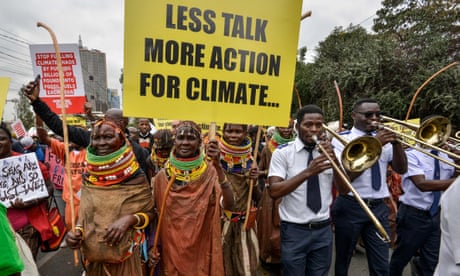
Africa’s largest meeting on the crisis finished last week amid arguments over ‘false solutions’ and unfulfilled promises. But will the lofty ideals presented translate into better lives for Africans?
Earlier that morning, the Nairobi Declaration had been adopted as a blueprint to guide the continent in future negotiations with the west in global forums such as the G20 meeting; the UN general assembly; the annual meetings of the World Bank Group and the International Monetary Fund; and Cop28.
At the heart of the declaration was Africa’s vulnerability to the vagaries of the climate crisis despite its small carbon footprint. Africa’s cities, the declaration states, will be home to more than 1 billion people by 2050, whose levels of poverty and inequality will make them more vulnerable to the hazards that have turned these areas into “disaster hotspots”. The urban poor are among the 600 million Africans without access to electricity and the 970 million who lack access to clean cooking technologies, despite Africa being touted as the next frontier fo
That the continent is unable to adapt to the climate crisis formed the bulk of last week’s talks and the declaration. Africa, according to the climate summit paper published by conservation charity WWF, needs $2.8tn between 2020 and 2030 to effectively implement the ambitious climate pledges set out by most African countries. While the declaration called on developed countries to honour the commitment to provide $100bn in annual climate finance as promised 14 years ago at the Copenhagen conference, the Kenyan president, William Ruto, was reluctant to take up the “you messed up, you must pay up” route.
“This is no ordinary summit,” Ruto told the 30,000 delegates. “We are not here just to talk about Africa or climate change in the usual way, which often accentuates our divisions – north versus south, developed versus developing, polluters versus the victims.” The summit, he outlined, was not to “catalogue grievances and list problems”, but “scrutinise ideas, assess perspectives and unlock solutions”. But all the ideas, perspectives and solutions discussed at the summit still hinged on wealthy states’ willingness to fulfil past pledges.
Almost every African country present at the summit walked away with a financing deal with western institutions. A final communique commended the “progressive capital commitments made during the week” totalling $26bn from public, private, and multilateral development banks, philanthropic foundations and dedicated partners in the development finance community. There could have been more unpublished pledges, summit organisers said.
As African leaders vowed not to play victims any more, the global north representing key polluters was watching, not from the sidelines but at the centre of the talks. Among the key speakers was John Kerry, Joe Biden’s climate envoy. His presence here, according to Kenya’s Daily Nation newspaper, seemed to have irked Uganda’s leader, Yoweri Museveni, who “could not sit and be lectured by [Kerry]”. Museveni did not attend the summit and neither did South Africa’s president, Cyril Ramaphosa. With up to 70% of power in South Africa coal-generated and the country’s coal exports to Europe expected to face carbon import tax, Ramaphosa would have been uncomfortable engaging with European leaders at the summit, including the EU Commission president, Ursula von der Leyen. Bola Tinubu, the president of Nigeria – one of Africa’s largest oil producers – also didn’t attend, taking the view that Nigeria shouldn’t be lectured by the world’s worst emitters.
Five hundred African civil society groups under the umbrella of the Africa People’s Climate Assembly, organised what they called the Real Africa Climate Summit. The organisations were concerned about what they called “false solutions” that were on the summit’s agenda, such as carbon markets, carbon credits and the use of technology as a viable alternative to phasing out harmful fossil fuels. These concepts, they said, are led by global north interests “and are being marketed as African priorities when in reality they will embolden wealthy nations and large corporations to continue polluting Africa”.
Maimoni Ubrei-Joe, a climate justice and energy programme coordinator at Friends of the Earth Africa, was blunt on the extractive exploitation model used by key polluters: “What should be Africa’s focus now is to stop the contributors to climate change at source and not look for shortcuts to keep extracting using the smokescreen of the carbon market, geoengineering and other false solutions. This Nairobi Declaration is short of these ideas and it could just be another beautiful document heading for the shelves.”
after newsletter promotion
A few days before the summit, these organisations had written to President Ruto asking him to take charge of the talks, which they said were at risk of being hijacked by interested parties from the west. The US-based consultancy firm McKinsey & Company was identified as having helped shape the summit’s concept note, which the organisations said did not champion Africa’s interests but those of the US and “the western corporations they represent”. They added: “Rather than advancing Africa’s interests and position on critical climate issues, the summit has been seized by western governments, consultancy companies and philanthropic organisations hellbent on pushing a pro-west agenda and interests at the expense of Africa.”
Still, many say it was a good show for Africa, in Africa. But only time will tell if the lofty ideals presented at the summit will translate into better and healthier living standards for Africans. As Kerry put it: “The words come easily. The actions seem to be a bit more difficult. Africa is meeting. Africa is talking. Africa is deciding.”



















